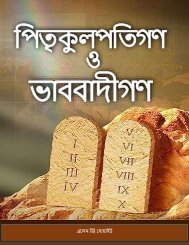Finishing the Race
Of all the games instituted among the Greeks and the Romans, the races were the most ancient and the most highly esteemed … The contests were governed by strict regulations, from which there was no appeal. Those who desired their names entered as competitors for the prize had first to undergo a severe preparatory training. Harmful indulgence of appetite, or any other gratification that would lower mental or physical vigour, was strictly forbidden. For one to have any hope of success in these trials of strength and speed, the muscles must be strong and supple, and the nerves well under control. Every movement must be certain, every step swift and unswerving; the physical powers must reach the highest mark.
Of all the games instituted among the Greeks and the Romans, the races were the most ancient and the most highly esteemed … The contests were governed by strict regulations, from which there was no appeal. Those who desired their names entered as competitors for the prize had first to undergo a severe preparatory training. Harmful indulgence of appetite, or any other gratification that would lower mental or physical vigour, was strictly forbidden. For one to have any hope of success in these trials of strength and speed, the muscles must be strong and supple, and the nerves well under control. Every movement must be certain, every step swift and unswerving; the physical powers must reach the highest mark.
You also want an ePaper? Increase the reach of your titles
YUMPU automatically turns print PDFs into web optimized ePapers that Google loves.
Source of wisdom are able to understand or explain <strong>the</strong> Scriptures. Men who have little of<br />
<strong>the</strong> learning of <strong>the</strong> schools are sometimes called to declare <strong>the</strong> truth, not because <strong>the</strong>y are<br />
unlearned, but because <strong>the</strong>y are not too self-sufficient to be taught of God. They learn in <strong>the</strong><br />
school of Christ, and <strong>the</strong>ir humility and obedience make <strong>the</strong>m great. In committing to <strong>the</strong>m<br />
a knowledge of His truth, God confers upon <strong>the</strong>m an honour, in comparison with which<br />
earthly honour and human greatness sink into insignificance.<br />
The majority of Adventists rejected <strong>the</strong> truths concerning <strong>the</strong> sanctuary and <strong>the</strong> law of<br />
God, and many also renounced <strong>the</strong>ir faith in <strong>the</strong> advent movement and adopted unsound and<br />
conflicting views of <strong>the</strong> prophecies which applied to that work. Some were led into <strong>the</strong> error<br />
of repeatedly fixing upon a definite time for <strong>the</strong> coming of Christ. The light which was now<br />
shining on <strong>the</strong> subject of <strong>the</strong> sanctuary should have shown <strong>the</strong>m that no prophetic period<br />
extends to <strong>the</strong> second advent; that <strong>the</strong> exact time of this advent is not foretold. But, turning<br />
from <strong>the</strong> light, <strong>the</strong>y continued to set time after time for <strong>the</strong> Lord to come, and as often <strong>the</strong>y<br />
were disappointed.<br />
When <strong>the</strong> Thessalonian church received erroneous views concerning <strong>the</strong> coming of<br />
Christ, <strong>the</strong> apostle Paul counselled <strong>the</strong>m to test <strong>the</strong>ir hopes and anticipations carefully by <strong>the</strong><br />
word of God. He cited <strong>the</strong>m to prophecies revealing <strong>the</strong> events to take place before Christ<br />
should come, and showed that <strong>the</strong>y had no ground to expect Him in <strong>the</strong>ir day. "Let no man<br />
deceive you by any means" (2 Thessalonians 2:3), are his words of warning. Should <strong>the</strong>y<br />
indulge expectations that were not sanctioned by <strong>the</strong> Scriptures, <strong>the</strong>y would be led to a<br />
mistaken course of action; disappointment would expose <strong>the</strong>m to <strong>the</strong> derision of<br />
unbelievers, and <strong>the</strong>y would be in danger of yielding to discouragement and would be<br />
tempted to doubt <strong>the</strong> truths essential for <strong>the</strong>ir salvation.<br />
The apostle's admonition to <strong>the</strong> Thessalonians contains an important lesson for those<br />
who live in <strong>the</strong> last days. Many Adventists have felt that unless <strong>the</strong>y could fix <strong>the</strong>ir faith<br />
upon a definite time for <strong>the</strong> Lord's coming, <strong>the</strong>y could not be zealous and diligent in <strong>the</strong><br />
work of preparation. But as <strong>the</strong>ir hopes are again and again excited, only to be destroyed,<br />
<strong>the</strong>ir faith receives such a shock that it becomes well-nigh impossible for <strong>the</strong>m to be<br />
impressed by <strong>the</strong> great truths of prophecy. The preaching of a definite time for <strong>the</strong><br />
judgment, in <strong>the</strong> giving of <strong>the</strong> first message, was ordered by God. The computation of <strong>the</strong><br />
prophetic periods on which that message was based, placing <strong>the</strong> close of <strong>the</strong> 2300 days in<br />
<strong>the</strong> autumn of 1844, stands without impeachment.<br />
The repeated efforts to find new dates for <strong>the</strong> beginning and close of <strong>the</strong> prophetic<br />
periods, and <strong>the</strong> unsound reasoning necessary to sustain <strong>the</strong>se positions, not only lead minds<br />
away from <strong>the</strong> present truth, but throw contempt upon all efforts to explain <strong>the</strong> prophecies.<br />
The more frequently a definite time is set for <strong>the</strong> second advent, and <strong>the</strong> more widely it is<br />
taught, <strong>the</strong> better it suits <strong>the</strong> purposes of Satan. After <strong>the</strong> time has passed, he excites ridicule<br />
and contempt of its advocates, and thus casts reproach upon <strong>the</strong> great advent movement of<br />
1843 and 1844. Those who persist in this error will at last fix upon a date too far in <strong>the</strong><br />
286


















